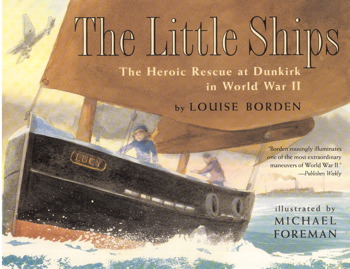The little ships by Louise
Borden, illustrated by Michael Foreman (Pavilion, 1997)
32 pages
Subjects:
World War Two, England, France, Dunkirk, boats, girls, picture books (Year 3-6)
Some covers have the subtitle: The heroic rescue at Dunkirk in World War II
Some covers have the subtitle: The heroic rescue at Dunkirk in World War II

Synopsis
In May 1940, the
unnamed narrator lives with her father, a fisherman, in the town of Deal on the
Kent Coast. She is a girl, but
“fisherman on the beach said I was my father’s daughter.” Her brother John is
away fighting in France. When word comes
that half a million British and French soldiers are trapped on the beaches of
Dunkirk, she disguises herself as a boy in some of her brother’s old
clothes and joins her father (in his fishing boat the Lucy) and an armada of "little ships" that sets sail across
the English Channel to rescue them.
I didn’t know
that people from English villages and towns actually signed up to go and help,
as shown in one of the illustrations. And I didn’t know that soldiers brought
back their pet dogs (and some strays) with them – over 200 dogs were aboard
ships landing in Dover!
There is a map
in the front, and a historical note and excerpt from Winston Churchill’s famous
speech (“we shall fight on the beaches…”) at the end. Some of the pages have a
lot of writing on them, and I would think that the text is longer than that of
an average picture book. There are a lot of illustrations of boats and ships,
which I guess is understandable!
Reviews:
Kirkus reviews (always a prestigious place to get a review) calls this "A moving,
fictionalized account of the ``miracle of Dunkirk,'' in which an armada of 861
ships ferried to safety across the English Channel over 300,000 Allied soldiers
who had been trapped in northern France by the Germans."
The Children's War blog says it is "an excellent book for introducing the topic of Dunkirk to younger kids but is also a good teaching tool for older kids who may already know something about World War II."
Author’s website
Louise Borden is an American writer from Cincinnati.
I’d never heard of her before reading this book, but now I’m hoping to
read more of her work. Her website has a very readable section about Becoming a
writer (under the About button). I like how she talks about riding
home on her bicycle as a child: “Pedaling slowly up my street may be where
I learned perseverance, something all writers need when they are working alone
at their desks.”
And I love what
she says about writers needing to have thinking time. It’s a long quotation but
it makes so much sense to me:
“Often I am in my car, driving to new places to
meet new people, and to talk about writing. I have a lot of thinking time on
those miles. And I have a lot of thinking time when I am working in my garden
at home. Thinking time: It's so very essential for a writer. I think about new
ideas for books, and new ways to write them. I think about what is important to
me, and the new things that I want to learn. I think about the books I read as
a child—and the books I am reading today.
I think about my family who are my
great encouragers. And my wonderful editors who understand, in just the right
way, my creative vision for a picture book. These thoughts always inspire me to
return to my desk and begin working on a rough draft for a new manuscript.”
Info about the illustrator
You can
read more about Michael Foreman on my review of his book War game.
Other books you might like:
The snow goose and The dolphin crossing, both already reviewed on this blog, are other books about Dunkirk. The evacuation of Dunkirk has
a resonance for England that is perhaps a bit like Gallipoli for us in New Zealand: a defeat,
but a heroic failure.
Things I didn’t know
Louise Borden’s
website has pictures of her research trip for writing this book. She took part in one of the Crossings of the
Association of Dunkirk’s Little Ships (as referred to in the Foreword), which
is “the surviving remnants of the intrepid band of assorted boats and yachts
that contributed so much to the miracle of Dunkirk.”
I didn't know there was an Association of Dunkirk's Little Ships! There is some
fascinating info about it on their website, including an answer to the
question “how do I identify if my boat took part in the Dunkirk evacuations?”
The Association returned to Dunkirk in
May 2015 to commemorate the 75th anniversary of Operation Dynamo, with 50 Little Ships escorted by the RNLI and the Royal Navy. There are some great photos and descriptions in this newspaper report from the Telegraph.
Links
There's a You tube clip here, which describes itself as WW II : RARE COLOR FILM :
DUNKIRK : PART 3 OF 3 1939 1940.
Have you read it?
Have you read it?
Have you
read this book? Let me know what you think!

No comments:
Post a Comment